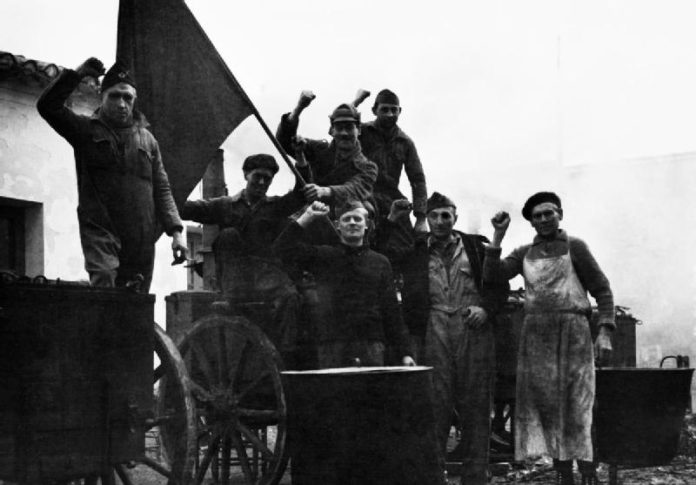
Socialistisk Biblioteks Tidslinje med links til begivenheder og personer i 1936.
Se også Index over personer, organisationer/partier og værker (som bøger, malerier, mm.), steder, begivenheder, mv., der er omtalt på hele Tidslinjen, titler og indhold på emnelisterne osv.
Bladliste

Nye blade:
- Arbejderbladets Ugeblad. [Produceret af Arbejderbladets redaktion]
- Arbejdet. Organ for Fagoppositionens Sammenslutning i Danmark. Ansv. Chr. Christensen.
- Fremad. Ungdommens Blad. Udg. af DKU.
- Neon. Organ for socialdemokratiske Studenter.
Se:
Arbejderhistorisk Bladliste, under året 1936
15. januar 1936
Socialdemokraten Fr. Borgbjerg dør i København. (Født i Boelslunde, Skelskør, 10. april 1866, se denne) .
5. februar 1936
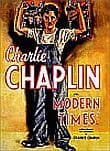
Charlie Chaplins film Modern Times (Moderne Tider), har premiere i New York.
Se:
- En vagabond i den moderne verden: Om Charles Chaplin Moderne Tider (1936). Af Ole Thaisen (16:9: filmtidsskrift, nr. 14, november 2005)
- Moderne Tider (Det Danske Filminstitut; Filmdatabasen)
- Modern Times (film) (Wikipedia.org)
- 75 years ago: Charlie Chaplin’s “Modern Times” released (World Socialist Web Site, February 2011)
Se også på YouTube.com:
- Charlie Chaplin Swallowed by a Factory Machine (1:23 min.)
- Charlie Chaplin – Factory Work (3:20 min.)
- Charlie Chaplin – Eating Machine (4:27 min.)
- Charlie Chaplin | Tempos Modernos (Modern Times) (1:16:52 hour). Hele filmen. 19:20 og ca. 2 min. er scenen med arbejderdemonstrationen.
Se også på Socialistisk Bibliotek:
Tidslinjen 16. april 1889 om Charlie Chaplin.
16. februar 1936
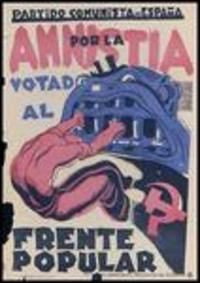
Spanish general election, 1936 (Wikipedia.org)
Se på Socialistisk Bibliotek:
- Linksamlingen: Den spanske borgerkrig og revolution 1936-1939 (Danish and Scandinavian litterature)
- Link collection: The Spanish Civil War and Revolution 1936-1939 (English litterature)
22. februar 1936
Den danske husmandsdigter Johan Skjoldborg dør. Født 22. april 1861, se denne.
7. marts 1936
Hitlers første krænkelse af internationale aftaler: Den tyske hær besætter Rhinland (afmilitariseret område if. Versailles-traktaten efter I.Verdenskrig).
Samme dag mister jøder i Tyskland stemmeretten til rigsdagsvalg.
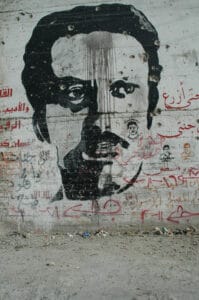
9. april 1936
Forfattteren Ghassan Kanafani fødes 8 April 1936 in Acre, Palæstina), talsmand for PFLP, myrdes 8. juli 1972 ved et israelsk attentat i form af en bilbombe i Beirut, Libanon,
Se på Socialistisk Bibliotek:
- Emnelisten: PFLP – “Mod imperialisme, zionisme og arabiske reaktionære”. Se afsnittet Ghassan Kanafani.
- Emneoversigten: Palæstina / Israel
26. april 1936
Generalstrejke i Palæstina mod det britiske besættelsesstyre.
Se:
- Palestinian general strike (Wikipedia.org)
- 1936-1939 Arab revolt in Palestine (Wikipedia.org). Se også samme tekst i anden interface på Wikiwand.
Generalstrejken 1936. Af Norman Kanafani (Palæstina-Info). Artiklen er en ny omskrevet version af en tidligere offentliggjort artikel “Da Palæstina gik tabt – generalstrejken i 1936” (Palæstina Orientering, vol.9, nr.4, 1987).
The birth of Palestinian Resistance and the 1936 uprising (RS21: Revolutionary Socialism in the 21st Century, September 12, 2014). “Neil Rogall looks at a long history of Palestinian resistance to occupation that culminated in the Arab revolt of 1936.”
The First Palestinian Intifada, 1936-1939. By Rod Quinn (What Next?: Marxist Discussion Journal, No.24, 2002). “For the Palestinians, those years marked the beginning and tragic end of one phase in a long-term struggle.”
The 1936-39 Revolt in Palestine. By Ghassan Kanafani (New York, Committee for a Democratic Palestine, 1972; online at Marxists Internet Archive). “Between 1936 and 1939, the Palestinian revolutionary movement suffered a severe setback at the hands of three separate enemies that were to constitute together the principal threat to the nationalist movement in Palestine in all subsequent stages of its struggle …”
Se også:
The Arab national movement in Palestine. Chapter 16 in Tony Cliff: The Problem of the Middle East (unpublished manuscript, 1946; online at the Marxists Internet Archive, June 2011). “What distinguishes Palestine from the other Arab countries is the existence of Zionism, which acts as an agent of imperialism and a refuge in which imperialist rule seeks shelter from the ire of the Arab masses.”
3. maj 1936
Folkefronten i Frankrig vinder valget, og 376 pladser ud af parlamentets 618 pladser.
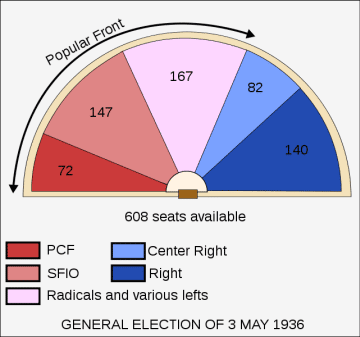
Se:
75 years ago: French elections point toward revolution (World Socialist Web Site, 25 April 2011)
Popular Front (France) (Wikipedia.org)
Video:
The Popular Front party wins French legislative elections in France (CriticalPast.com, 40 sec., no sound)
4. juni 1936
Leon Blum danner første folkefrontsregering i Frankrig – og følges af store “forventningsstrejker”. Se 3. maj 1936 ovenfor om selve valget.
Links:
- Blum, Leon (Leksikon.org)
- Leon Blum (Wikipedia.dk). Se også de meget længere / much longer articles in engelske og franske artikler på Wikipedia.
- Popular Front (France) (Wikipedia.org)
- Matignon Agreements (1936) (Wikipedia.org)
Et håb blev knust (Frankrig 1936). Af Martin Johansen (Socialistisk Arbejderavis, nr.19, maj 1986). ” … i Frankrig i 1936 kom der et fantastisk opsving i arbejdernes kampe, som gav et kort glimt af mulighederne for at vende situationen.”
”Man måste kunna avsluta en strejk”: 1936 i Frankrike. I Fernando Claudin: Krisen i den kommunistiska rörelsen. Del 1 (pdf) (Bokförlaget Röda Rummet och Förlaget Barrikaden, 1979, s.125-132; online på Marxistarkiv.se). Scroll nedad.
Vänsterkritik och revolutionär opposition mot folkfronten (1936-1938) (pdf). Av Pierre Broué och Nicole Dorey (Marxistarkiv.se, 25. januar 2019, 34 s.). Artikeln publicerades ursprungligen i tidskriften Le Mouvement Social, nr.54, januari-mars 1966.
The Popular Front then and now – France and the elections (RS21, 29 June 2024). “Ian Birchall looks back at the history of the original Popular Front and outlines what’s at stake in France’s general election.”
France’s Popular Front: lessons from the 30s (Counterfire, 25 June 2024). “The Popular Front shows the need for unity against fascism—and the political independence of the working class and revolutionary organisation.”
What are the lessons from the Popular Front against fascism in 1930s France? By Charlie Kimber (Socialist Worker, Issue 2910, 15 June 2024). “The Popular Front shows the need for unity against fascism—and the political independence of the working class and revolutionary organisation.”
From revolutionary possibility to fascist defeat: The French Popular Front of 1936-38 (Marxist Left Review, Issue 19, Summer 2020). “Sandra Bloodworth draws on the French experience to refute reformist calls for a revival of Popular Front strategies.”
Meditations on a corpse. By Simone Weil (New Left Review, Issue 111, May-June 2018). “Cool post-mortem on the 1936 Popular Front government in France, written while it was still technically alive.”
Assessing Léon Blum. By Mitchell Abidor (Jacobin: Reason in Revolt, 26 September 2016). “In French Popular Front leader Léon Blum we find both the grandeur and misery of interwar social democracy.”
June 1936: the French general strike and factory occupations, Part 85 in: Neil Faulkner: A Marxist History of the World (Counterfire, 22 July 2012). “In the mid-1930s French workers launched a wave of strikes and occupations. Neil Faulkner explains how the Stalinised Communist Party worked to contain this resistance.”
The Popular Front, a social and political tragedy: the case of France. By Dan La Botz (New Politics: A Journal of Socialist Thought, Vol.13, No.2, Whole No.50, Winter 2011, p.91-104): “The Popular Front strategy not only failed to stop fascism in France, but it also tended to disorient the working class, …”
1936: ‘The French revolution has begun’. By Sofie Buckland (Solidarity, 3/95, 22 June 2006). “The Popular Front [was] responsible for the demoralisation of the working class and the buffering of the bourgeois parties previously in decline …”
The will of the people: France’s red hot winter (Socialist Review, Issue 193, January 1996). “June 1936 remains an inspiration and a lesson. It shows how quickly a situation can develop in which workers after a long period of defensiveness can go onto the offensive …”
France: ‘Everything is possible‘: The June 1936 strike wave. By Shane Bentley (Green Left, November 17, 1993). “On May 3, the Popular Front won a massive electoral victory.”
When everything was possible. By Costas Lapavitsas (Socialist Review, Issue 88, June 1986, p.31-32). Review of Jacques Danos and Marcel Gibelin, June ’36: Class Struggle and the Popular Front in France (Bookmarks, 1986, 272 p.)
Too much, too little, too late: left Social Democracy in the French Popular Front. By Ian Birchall (International Socialism, Issue 13, Summer 1981, p.74–89). “We can learn some interesting lessons from the experience of the left in the French Socialist Party during the nine teen-thirties.”
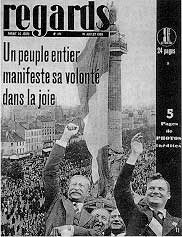
Historical texts:
Le Mouvement de Greve (Critical Past, June 1936, 2 min. 22 sec., sound French). “Closed shops during strike and crowd demonstrations on streets in France.”
“The movement still grows” – Headlines from L’Humanité, May/June 1936 (Marxists Internet Archive)
Why the French Popular Front failed. By Edgar Hardcastle (Socialist Standard, July 1939; online at Marxists Internet Archive)
Workers Front and Popular Front. By Alfred Rosmer (New International, Vol.4, No.2, February 1938)
From People’s Front to French Front. By Maurice Spector (Socialist Alternative, Vol.2, No.9, October 1936)
Whither France? (1934-1936) . By Leon Trotsky (New Park, London, 1974; online at Marxists Internet Archive)
Se også / See also:
Glossary of Terms: Popular Front (aka People’s Front) (Marxists Internet Archive)
The Front Populaire and the making of the French Communist Party (1920–1962). By Selim Nadi (International Socialist Review, Issue 104, Spring 2017, p.110-121)
Communist Party of France (Marxists Internet Archive). Links to articles of 1936-1939, and to general secretary Maurice Thorez Archive. Incl: From Thorez’s Autobiography (1960): The Popular Front
Se også på Socialistisk Bibliotek:
- Tidslinjen: 25. juli 1935, om Kommunistisk Internationale 7. kongres / Communist International 7th Congress.
- Linksamlingen: Den spanske borgerkrig og revolution 1936-1939 (Danish and Scandinavian litterature)
- Link collection: The Spanish Civil War and revolution 1936-1939 (English litterature)
17. juni 1936
Britiske filminstruktør Ken Loach fødes i Nuneaton, Warwickshire, England.
Se:
- Loach, Ken (Leksikon.org).
- Ken Loach (Wikipedia.org).
- Ken Loach (IMDb – Internet Movie Data base).
Se også på Socialistisk Bibliotek:
Personlisten Ken Loach, med links til nogle af hans film.
18. juni 1936
Den russiske sociale forfatter Maksim Gorkij dør (født 28. marts 1868, se denne)
28. juni 1936
Anarkisten Alexander Berkman dør for egen hånd i Nice, Frankrig (født 21. november 1870 i Vilnius, nuværende Lithauen), se denne.
7. juli 1936
Den danske anarkistiske forfatter Jean Jacques Ipsen dør (født 6. januar 1857, se denne).
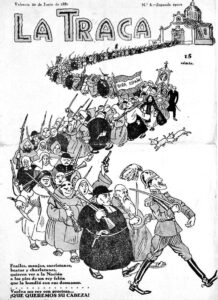
17. juli 1936
Kl. 2 om natten starter den højre-nationalistiske opstand, imod regeringen, der giver statsskuddet til den spanske revolution og borgerkrig (endeligt nederlag 1939).
Se på Socialistisk Bibliotek:
- Emnelisten Den spanske borgerkrig og revolution 1936-1939 (Danish and Scandinavian Litterature)
-
See:
- Link collection The Spanish Civil War and Revolution 1936-1939 (English litterature)
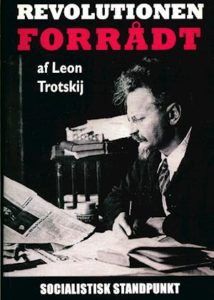
4. august 1936
Lev Trotskij færdiggør manuskriptet til sin sidste bog The Revolution Betrayed: What is the Soviet Union and Where is it Going? Udkommer på engelsk 1937 (online på Marxists Internet Archive). Dansk udgave: Revolutionen forrådt: Hvad er Sovjetunionen og hvor styrer den hen? Oversat af Georg Moltved (Borgen, 1960, 268 s.). Ny udgave: Revolutionen forrådt (Socialistisk Standpunkt, 2006, 242 s.). Online-udgave på Marxistiske Klassikere (bearbejdet af Jørn Andersen/Marxisme Online & Socialistisk Standpunkt).
Se:
- The Revolution Betrayed (Wikipedia.org)
Sovjetunionens karakter – et spørgsmål der deler vandene. Af Marie Frederiksen (Revolution, 2. december 2021). Forord til ny udgave/oversættelse af Revolutionen forrådt (Forlaget Marx, 2021, 308 sider). Bl.a. om fejloversættelse i Georg Moltved-udgaven fra 1960.
13. The Revolution Betrayed. Chapter in Tony Cliff: Trotsky: The darker the night the brighter the star 1927-1940 (Bookmarks, 1993, p.308-338; online at Marxists Internet Archive). “Besides refuting the Stalinist claim that socialism had been established in the Soviet Union, The Revolution Betrayed also aimed to give a comprehensive historical and social analysis of the degeneration of the Russian revolution.”
Was the revolution betrayed? By Isaac Deutscher (New Statesman, 24 August 1957; republished in Marxism in our Time (Jonathan Cape Paperback, 1972, p.265-271); online at Marxists Internet Archive) “… of all Stalin’s opponents, Trotsky alone has produced a systematic and comprehensive critique. In The Revolution Betrayed he offered the final version of that critique …”
After Ten Years: On Trotsky’s The Revolution Betrayed. By C.L.R. James (New International, Vol.12, No.8, October 1946, online at Marxists Internet Archive). “… contains all that Trotsky thought essential to an understanding of Stalinist Russia as a new form of society..”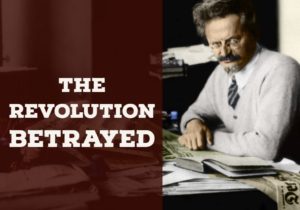
Leon Trotsky: The Workers’ State, Thermidor, and Bonapartism (February 1935) (New International, Vol.2, No.4, July 1935, p.116–122; online at Marxists Internet Archive). “The article constitutes the thesis that is elaborated in his well-known book The Revolution Betrayed.”
Se også:
Tidslinjen 7. november 1879 om Lev Trotskij (Socialistisk Bibliotek).
10. august 1936
Sidste hefte af Arbeidernes Leksikon udkommer. Se under første hefte 11. marts 1931.
19. august 1936
Den spanske digter Frederico Garcia Lorca (født 5.6.1898 i Fuerte Vaqueros) myrdes af fascisterne under den spanske borgerkrig i Granada-provinsen.
Se:
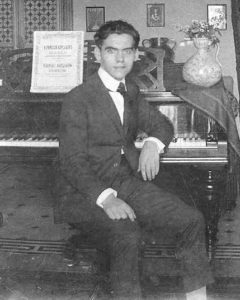
- Frederico Garcia Lorca (Denstoredanske.dk)
- Frederico Garcia Lorca (Wikipedia.org). Incl.: Biography – Major works – References & links.
Folkelig poesi i køkkenet: I Federico Garcia Lorcas spor. Af Lars Grenaa (Kommunistisk Politik, nr.11, 1998, side 14; på Oktobernet). “I 1998 er det hundrede år siden at Federico Garcia Lorca blev født. Det har medfødt en bølge af festivaler og bogudgivelser.” Fra et studiebesøg i Grenada, kirkegården og henrettelsesstedet for Lorca.
Individual, class and nation in Spain, 1936–1939 (Libcom.org, 25 Ocober 2016). “Juan McIver looks at the Spanish Civil War and the work of poet and playwright Federico Garcia Lorca.”
Documents confirm fascists murdered Spanish poet Federico Garcia Lorca. By Alejandro López (World Socialist Web Site, 30 April 2015). “The report, written in 1965 by the Regional Brigade of Social Investigation of the Police Headquarters of Granada, directed to the civil governor of the province, is the first official admission that fascist forces murdered Lorca …”
Federico Garcia Lorca: the poet at five in the afternoon. By Mike Gonzalez (Socialist Review, Issue 324, April 2008). “When fascist thugs murdered the 38 year old poet Federico Garcia Lorca in Granada in August 1936, they pinned a note to his body. It denounced the writer for his politics and for his homosexuality.”
Lorca: words of desire and words of defiance (Socialist Worker, Issue 2018, 16 September 2006). “Sinead Kennedy reflects on the life and work of the Spanish poet and playwright Federico Garcia Lorca.”
Litteratur:
- Federico Garcia Lorca (Litteratursiden.dk). Værker på dansk.
Se også:
Federico Garcia Lorca’s body to be exhumed. By Paul Stuart (World Socialist Web Site, 11 October 2003) + Controversy surrounds opening of Garcia Lorca’s grave. By Vicky Short (28 August 2004)
The Spanish Civil War and Google Street View. New project blends images from the siege of Madrid with modern-day photos of the capital (El Pais, 1. december 2014) Historiske fotos indsat i nutidens bybilleder, som fx foto # 4:
The famous Civil War slogan “They shall not pass” hanging from calle Toledo.
Se også på Socialistisk Bibliotek:
- Linkbox: Den spanske borgerkrig og revolution (Danish and Scandinavian Litterature)
- Linkbox: The Spanish Civil War and Revolution 1936-1939 (English litterature)
22. august 1936
Den danske trotskist og internationale solidaritets-aktivist Vagn Rasmussen fødes i Viborg (dør 9. juli 2016, se denne)
19.-24. august 1936
Den første af de tre offentlige uhyrlige Moskvaprocesser (1936-38).
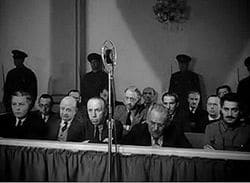
Se:
- Moskvaprocesserne (Leksikon.org)
- Den store Terror 1936-1938 (Folkedrab.dk). Med kilder.
- Moskvaprocesserne (Wikipedia.dk) + Moscow Trials (Wikipedia.org) + Great Purge (Wikipedia.org)
- Glossary of Events: Moscow Trials (Marxists Internet Archive)
- Great Terror (1936-39) (Marxists Internet Archive; Soviet History). Primary and contemporaneous sources.
- Soviet Show Trials (Spartacus Educational)
- Moskvarättegångarna (Marxistarkiv.se). Dokumenter.
- Artiklar om 30-talets terror (Marxistarkiv.se)
- Böcker om 1930-talets terror (Marxistarkiv.se)
Antiterrorismens algebra: Statsopbygning og fjendebillede under Moskvaprocesserne 1936-38 (pdf). Af Bertel Nygaard. I: Antiterrorismens idéhistorie: Stater og vold i 500 år. Red. Mikkel Thorup og Morten Brænder (Århus Universitetsforlag, 2007, p.149-157; online på Århus Universitet). “Som det vil fremgå i det følgende, var her reelt tale om en fiktiv fjende, opbygget gennem et netværk af løgne og fordrejninger fra de statslige myndigheders side.”
Moskva processerne, del 1. Af Rob Sewell (Revolution, 31. december 1999) + Del 2. “Da Stalin havde besejret Trotskijs venstreopposition, vendte han sig imod alle sine andre modstandere, deriblandt hans tidligere venner på højrefløjen …”
Moskvaprocessernas innebörd (pdf). Av Max Eastman (Marxistarkiv.se, 11. oktober 2018). “… utdrag ur Eastmans bok Socialismens kris och Stalins Ryssland (sv. uppl 1941, am. orig 1939), som handlar om Moskvarättegångarna.
Moskvaprocesserna (1964) (pdf). Av Pierre Broué (Marxistarkiv.se, 2007, 143 p.). “I denna bok gör den franske marxistiske historikern Pierre Broué en grundlig genomgång och analys av Moskvarättegångarna.”
Om Moskvarättegångarn (pdf). Av Kenth-Åke Andersson (Marxistarkiv.se, 2006, 53 s.). Ur Fjärde Internationalen 7-8/72 (Lögnens renässans): “KÅA’s redogörelse för och analys av Moskvarättegångarna står sig fortfarande utmärkt, även om det efter Sovjetunionens sammanbrott kommit fram mycket mer dokumentariskt material.”
Eighty years since the first Moscow Trial. By Fred Williams (World Socialist Web Site, 1 September 2016). “The Moscow Trials, and the blood purges that followed, had a devastating impact, virtually annihilating the socialist elements in the working class and intelligentsia.”
The Moscow Trials: A lesson from history. By Jim Brookshaw (In Defence of Marxism, 22 October 2012). “Their aim was to liquidate the entire remaining Bolshevik old guard …”
Defending historical truth. By Andrea Peters (World Socialist Web Site, 9 September 2009). Review of Vadim Rogovin’s Stalin’s Terror of 1937-1938: Political Genocide in the USSR (Mehring Books, 2009). See also The Introduction by Vadim Z. Rogovin: 1937: Stalin’s Year of Terror (29 December 1998).
See more books by Rogovin about Stalinism from Mehring Books + obituary by David North: In memory of Vadim Z. Rogovin (World Socialist Web Site, 15 December 1998).
Remembering the Moscow Trials. By James Woudhuysen (Spiked, 16 April 2007). “Amid today’s craze for anniversaries, there’s one episode in history that nobody – especially on the left – wants to talk about.”
The Moscow Trials. By Hugh Dewar (Survey: A Journal of East and West Studies, No.41, April 1962, p.87-95; online at Marxists Internet Archive). “The circumstances of the time made many politically conscious people desire above all to think the best of the Soviet Government …”
The British Stalinists and the Moscow Trials. By Joseph Redman i.e. Brian Pearce] (Labour Review, Vol.3, No.2, March-April 1958; online at Marxists Internet Archive). “… the articles purpose is merely to recall how the leaders and spokesmen of the Stalinist organization in Britain reacted to the trials and what some of the effects of their reaction were in the British working-class movement …” Svensk udgave: De brittiska stalinisterna och Moskvarättegångarna (pdf) (Marxistarkiv.se)
Behind the Moscow Trial. By Max Shachtman (New York, Pioneer Publishers, 1936, 142 p.; online at Marxists Internet Archive). The book as pdf-file. “The execution of the 16 men on August 24, 1936 was the result of the biggest frame-up known in history!” Svensk udgave: Bakom Moskvarättegången (pdf) (Marxistarkiv.se, 11. september 2017)
The Red Book on the Moscow Trials (1936). Documents collected and edited by Leon Sedov (London, New Park, 1980, 120 p.; online at Marxists Internet Archive). “The book was the major literay contribution to the revolutionary movement by Trotsky’s son, Leon Sedov.”
The witchcraft trial in Moscow. By Friedrich Adler (London, Labour Publications, 1936, 35 p.; online at Marxists Internet Archive). Friedrich Adler (1879-1960) was a long-standing Austrian Social Democrat.
Se også på Socialistisk Bibliotek:
- Emneoversigt Rusland /Russia
- Tidslinjen 23. september 1883 om Grigorij Zinovjev.
- Tidslinjen 2.-13. marts 1938 om retssagen mod “blokken af højre og trotskister” (Bukharin mfl.)
- Tidslinjen 15. marts 1938 om Nikolaj Bukharin.
- Tidslinjen 5. marts 1953 om Josef Stalin.
- Tidslinjen 7. november 1879 om Lev Trotskij.
- Emnelisten Den Russiske Revolution 100 år
- Emnelisten Den Russiske Revolution, fra februar – oktober 1917
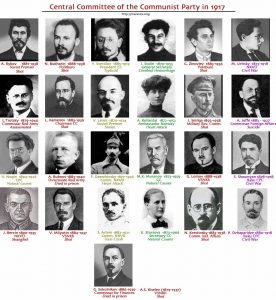
25. august 1936
Dagen for mordene på de gamle bolsjevikker, dødsdømt i den første Moskva-proces (se 19. august 1936 ovenfor).
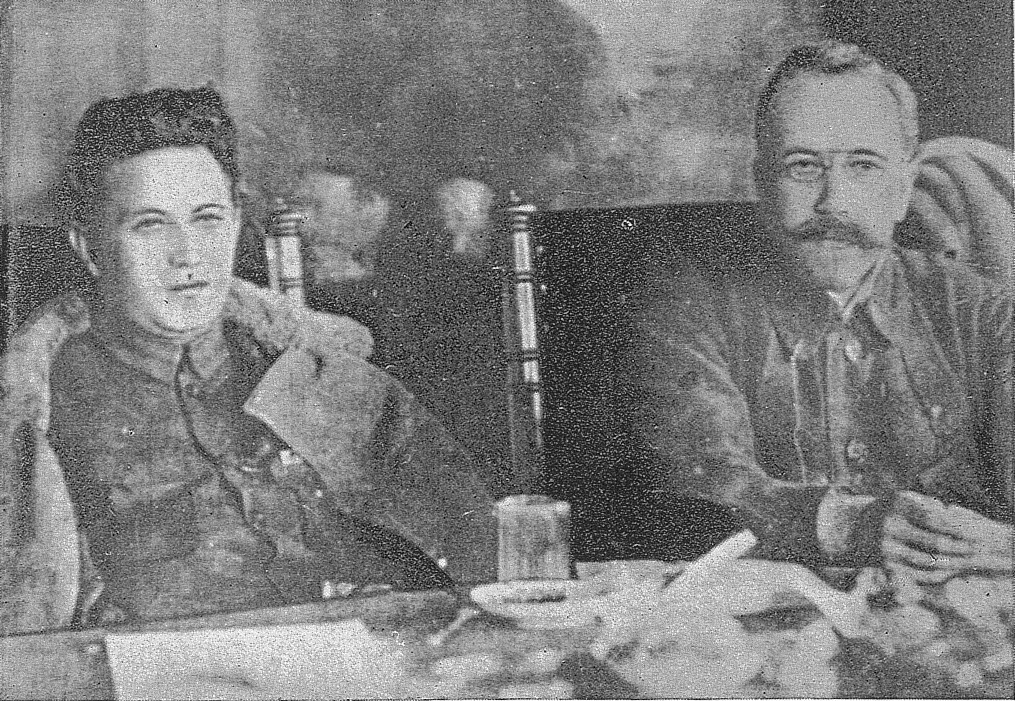
Mest fremtrædende var – (hhv. til venstre og højre på foto) Grigorij Zinovjev (født 23. september 1883, se denne) og Lev Kamenev.
21. september 1936
Den marxistiske sociolog Nicos Poulantzas fødes i Athen, Grækenland. (Dør i Paris 3. oktober 1979, se denne)
26. september 1936
Den sydafrikanske antiapartheid- og ANC-leder Winnie Mandela fødes i Bizana (Eastern Cape province). (Dør i Johannesburg, 2. april 2018, se denne)
4. oktober 1936
Søndag den 4. oktober arrangerede det britiske fascistparti, British Union of Fascists (BUF), under ledelse af Oswald Mosley, ca. 5.000 “sortskjorte”-march i London, blev mødt af 100.000 antifascister, koncentreret på Cable Street i Øst-London.
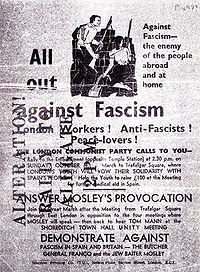
Se:
- Cable Street: Guide to East London (Go Britannia! Travel Guide)
- Battle of Cable Street (Wikipedia.org). Med link til bl.a. svensk artikel.
The Battle of Cable Street: 80 years on. By Steve Silver and David Emmett (Hope not hate, 4 October 2016; online at Internet Archive). “This multimedia website looks at the history of 4 October 1936 and its subsequent commemoration.”
Battle of Cable Street, 1936, photo gallery (Libcom.org)
Battle of Cable Street. Site with History & Gallery (online at Internet Archive)
Articles:
The Battle of Cable Street (RS21, One of the biggest anti-fascist victories in British history is recounted and placed in its historical context. This is based on a talk by rs21 member John Walker, given to Oxford Retired Members Branch of Unite the Union.”
When workers beat the fascists: how the Left fought the antisemites at Cable Street (pdf)(Workers’ Liberty, 3/69, December 2019, 13 p.). “Cable Street entered working-class legend. It is rightly remembered as somethingthe working class and its allies won against the combined might of the state and the fascists.”
Cable Street remembered. By Sam Gordon (Links: International Journal of Socialist Renewal, November 2, 2019). “In October 1936, events occurred in the East End of London that captured the attention of Left political activists for a generation.”
Cable Street and its aftermath – how the Blackshirts tried and failed to build in London’s East End (RS21: Revolutionary Socialism in the 21st Century, October 7, 2016). “Gary McNally argues against a recent trend among historians to dismiss the antifascist demonstration as counterproductive.”
The day East Enders built barricades (Socialist Review, Issue 417, October 2016). “Simon Shaw looks at the heroic actions of that day, their wider context and the traditions of organisation that made victory possible.”
‘We still haven’t learned the lesson of the Battle of Cable Street 80 years on’ (Mirror, 1 October 2016). “Willie Myers, then 14, found himself in a sea of protesters as 7,000 uniformed fascists tried to force their way through London’s East End.”
Battle of Cable Street: the fight against fascism (Counterfire, September 26, 2016). “As the 80th anniversary of the Battle of Cable Street approaches, Chris Bambery looks at the events that took place in 1936 Britain and the lessons we can take from them.”
‘I’d do it all over again’: last hurrah for the veterans of Cable Street. By Harriet Sherwood (The Guardian, 25 September 2016). “As the East End marks the 80th anniversary of its stand against fascism, its radical spirit has not been extinguished”.
1936: The Battle of Cable Street. By Sam Ashton (In Defence of Marxism, 4 October 2011). “… a momentous event in which the working people of London united to deliver a decisive blow against the menace British fascism.”
Cable Street – they did not pass. By Patrick Ward (Socialist Worker, Issue 2271, 1 October 2011). “The Battle of Cable Street was a key moment in anti-fascist history when mass working class resistance stopped the Blackshirts.”
Fighting Fascism: From Cable Street 1936 to Tower Hamlets 2011 (Socialist Review, Issue 362, October 2011). “Martin Smith looks at the lessons for the fight against the EDL, while Dave Renton explores the history of Cable Street, where Oswald Mosley’s fascists were stopped 75 years ago.”
Cable Street 1936: when workers stopped the fascists. By Ruah Carlyle (Solidarity, Issue 217, 21 September 2011). “The Jewish community had its own ex-servicemen’s anti-fascist militia …”
‘The Battle of Cable Street’: 75 years on. By David Rosenberg (History Workshop Online, January 8, 2011). “… an iconic moment in the struggle against Sir Oswald Mosley’s British Union of Fascists.”
Day the East End said ‘No pasaran’ to Blackshirts. By Audrey Gillan (The Guardian, 30 September 2006). “Their victory over racism and anti-Semitism on Sunday October 4 1936 became known as the Battle of Cable Street and encapsulated the British fight against a fascism that was stomping across Europe.”
1936: Fascists and police routed – the Battle of Cable Street (Libcom.org, Sep 12, 2005). “An eye witness account by Reg Weston, Higham resident and life-time NUJ member.”
The Battle of Cable Street: myths and realities. By Richard Price and Martin Sullivan (Workers News, March-April 1994; online at What Next!). “With the same area once again targeted by fascists, the Battle of Cable Street contains valuable lessons for today.”
The Battle of Cable St, 1936 (Libcom.org, July 21, 2007). Chapter 12 of Joe Jacobs, Out of the Ghetto (London, Janet Simon, 1978)
Fighting the beast – Fascism: the lessons of Cable Street. By Colin Sparks (International Socialism, No.94, January 1977). “Fourty years ago the British Union of Fascists were pushing hard around the ‘enemy’ of the day – the Jews. By and large, the labour movement won that battle. It is worth looking at some of the lessons learnt then.”
Videos:
1936 feature (Reuters) (YouTube, 2:08 min)
Max Levitas “the Battle of Cable Street” (YouTube, 9:35 min.). 90 year old eyewitness to the Battle of Cable Street speaks to a group during a workshop.
The Battle of Cable Street 2010 (YouTube, 1:21 min.)
Battle of Cable Street (kortfilm m. animation). By Yoav Segal, 2006 (YouTube, 7:57 min.)
See also:
Daily Mail: ” supporting Fascism (Daily Mail Historical Archive Highlights #5)
They shall not pass/No Pasaran (Wikipedia.org)
Se også på Socialistisk Bibliotek:
- Tidslinjen 13. august 1977 om antifascistisk mobilisering i Lewisham.
- Linkboxen Fascisme & anti-fascisme
22. oktober 1936
Medstifter og formand for Black Panther Party, Bobby Seale fødes i Dallas, Texas, USA.
Biografisk:
- Bobby Seale (Wikipedia.org). With links.
- Bobby Seale (Spartacus Educational)
- Bobby Seale: From the Sixties to the Future (eget site).
Bobby Seale. Linoliumstryk, plakat af Dea Trier Mørch, 1969. Kilde: Pinterest https://www.pinterest.dk/pin/342766221638152655/?d=t&mt=login
Litteratur (på dansk):
- Bobby Seale: Tiden er inde: det sorte panterpartis historie (Gyldendal, 1971, 375 s.). English edition online: Seize the time: The story of the Black Panther Party and Huey P. Newton (Libcom.org)
- Bobby Seale: Den ensomme vrede: selvbiografi (Rhodos, 1978, 329 s.).
- Jørgen Dragsdahl: Det Sorte Panterparti: Amerikas revolutionære avantgarde (Røde Hane, 1970, 202 s.)
- Angela Davis: En selvbiografi. Af Angela Davis (Gyldendal, 1975, 361 s.)
- Hvis de kommer om morgenen: modstandsrøster. Af Angela Davis, Ruchell Magee, Soledad-brødrene (Tiden, 1972, 176 s.)
- Huey P. Newton: Forsvar for selvforsvar (Politisk Revy, 1971, 80 s.)
- Huey P. Newton: Lad os holde ideen om det revolutionære verdenssamfund og Huey P. Newtons uovervindelige tanker højt (Særtryk af Politisk Arbejde, u.å., 16 s.). Huey P. Newton’s budskab på Boston College 18. november 1970.
- Eldridge Cleaver: Sjæl på is: åbne breve til USA (Rhodos, 1969, 185 s.)
- Bobby Seale: Den ensomme vrede: selvbiografi (Rhodos, 1978, 329 s.).
Se også:
English edition online: Seize the time: The story of the Black Panther Party and Huey P. Newton (Libcom.org)
Linkbox: Black Power: Historie og personer for flere links om bevægelsen, partiet, personer m.m.
23. november 1936
![Carl von Ossietzky, Publizist, geb. 3.10.1889 in Hamburg gest. 4.5.1938 in Berlin, an den Folgen der KZ Haft als Häftling im Konzentrationslager Esterwegen. [Mai 1936 wird Ossietzky bis zu seinem Tode unter ständiger Bewachung der Polizei, im Staatskrankenhaus der Polizei in Berlin untergebracht .] 1934. German Federal Archives Photo: Unbekant. (CC BY-SA 3.0 DE).](https://socbib.dk/wp-content/uploads/2007/12/Bundesarchiv_Bild_183-93516-0010_Carl_von_Ossietzky-210x300.jpg)
Se:
Ossietzky-sagen (Leksikon.org).
Ossietzky, Carl von (Fredsakademiet: Freds- og sikkerhedspolitisk Leksikon)
Carl von Ossietzky (Wikipedia.org). Links til kortere danske og længere tyske artikler.
Se også:
Freundeskreis Carl von Ossietzky (Fredsakademiet: Freds- og sikkerhedspolitisk Leksikon)
m. links, inkl. bogen: Kurt Singer: Carl von Ossietzky: Fredshelten i Koncentrationslejren (Frem-Forlag, 1936, 45 sider; på omslaget: Fredens Forkæmper som frivilligt blev Martyr i Koncentrationslejren og er indstillet til Nobels Freds-Pris).
30. december 1936
Bilarbejderne i Flint, Michigan, starter besættelser, der fører til 135.000 i strejke mod General Motors.
“The most important strike in American labor history.”
Se:
Flint Sit-Down Strike (Wikipedia.org)
Se også på Socialistisk Bibliotek:
- Emneoversigt: U.S.A / United States of America
- Linkboxen: Arbejdskampe i USA i 1930’erne / Worker’s struggles in the US during the 1930’s
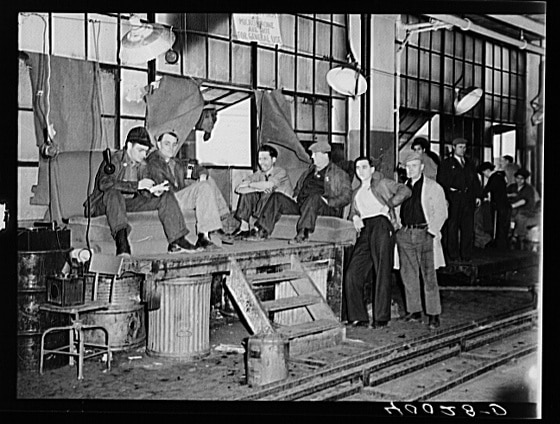
















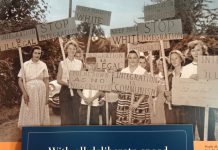
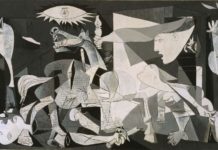

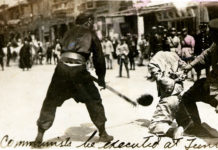

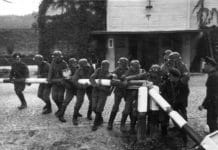












![Illustration to Robert Burns' poem Auld Lang Syne by J.M. Wright and Edward Scriven. The Complete Works of Robert Burns: Containing the Poems, Songs, and Correspondence. Illustrated By W.H. Bartlett, T. Allom, and Other Artists. With a New Life of the Poet, and Notices, Critical and Biographical[1] by Allan Cunningham. Published in London by George Virtue. No year is given explicitly, but "James Gibson 1856" has been handwritten inside the front cover, it's dedicated to a MP, Archibald Hastie of Paisley, who was no longer a MP by 1857, and some of the artists and engravers were dead before 1842. As such, I'm going with c. 1841 as the year, though it could be as late as 1856, when James Gibson evidently acquired. From: The Complete Works of Robert Burns: Containing the Poems, Songs, and Correspondence. Illustrated By W.H. Bartlett, T. Allom, and Other Artists. With a New Life of the Poet, and Notices, Critical and Biographical by Allan Cunningham, London: George Virtue. Drawn by John Masey Wright (1777–1866, artist), Engraved by John Rogers (c. 1808-c. 1888, engraver), Restored by Adam Cuerden (1979–, restorationist), Cropped by Beyond My Ken. Public Domain.](https://socbib.dk/wp-content/uploads/2018/02/John_Masey_Wright_-_John_Rogers_-_Robert_Burns_-_Auld_Lang_Syne_crop-100x70.jpg)